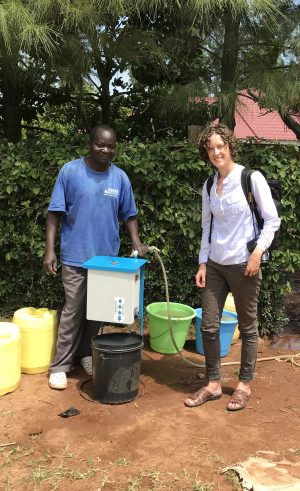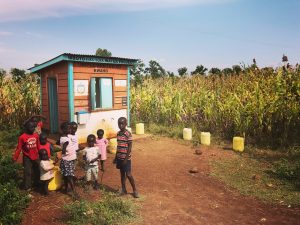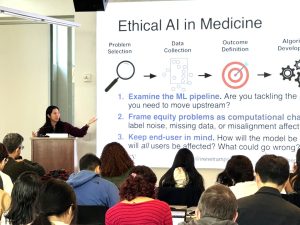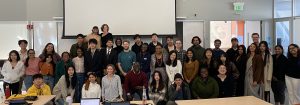
Development Engineering Prof. Amy Pickering, Blum Center Distinguished Chair in Global Poverty and Practice at UC Berkeley, and Dr. Katya Cherukumilli, a postdoctoral scholar in Pickering’s lab, have won a $1.9 million award to increase access to clean and safe water in low-income urban communities around the world. The Open Philanthropy grant will go toward scaling up and deploying the Venturi, the in-line (passive) chlorinator device that was originally designed by local engineers in Bangladesh, Kenya, and the U.S.
Pickering, Cherukumilli, and their team will collaborate with field-implementation partners CARE and Davis and Shirtliff in Kenya, as well as Prof. Jenna Davis at Stanford University, to test the device in new settings including healthcare facilities and schools. The team has also been working with product design and engineering graduate students on campus to “assess the performance of the Venturi using liquid chlorine produced via electrochlorination and to lay the groundwork for using passive chlorinators at handpumps in the future,” says Cherukumilli.

Water can get contaminated on its way through inadequate piping, sewage, and drainage systems — an issue exacerbated by growing populations and increased reliance on intermittent water supplies. The Venturi works at the spot where people collect water, such as taps, and automatically adds a precise dose of liquid chlorine to the water that disinfects it while remaining undetectable to users — all without requiring electricity, moving parts, or frequent input on the part of users.
The possibilities are huge. The Joint Monitoring Program has estimated that over 2 billion people don’t have access to clean water, including a quarter of the world’s healthcare facilities. The consequences can be staggering, including 300,000 or so children who die before the age of five each year due to diarrheal disease. Not only is the Venturi easy to operate and maintain, but diluted bleach needed to make the liquid chlorine is easily found in low-resource settings, and each unit of the device is expected to cost only $35 at scale. The team’s field testing has already shown that this approach to water purification could reduce child diarrhea cases by about 23 percent.
“We are excited about setting up manufacturing of the Venturi in Kenya and working with our partners on viable implementation models for increasing access to safe water in schools and health care facilities,” says Pickering.





